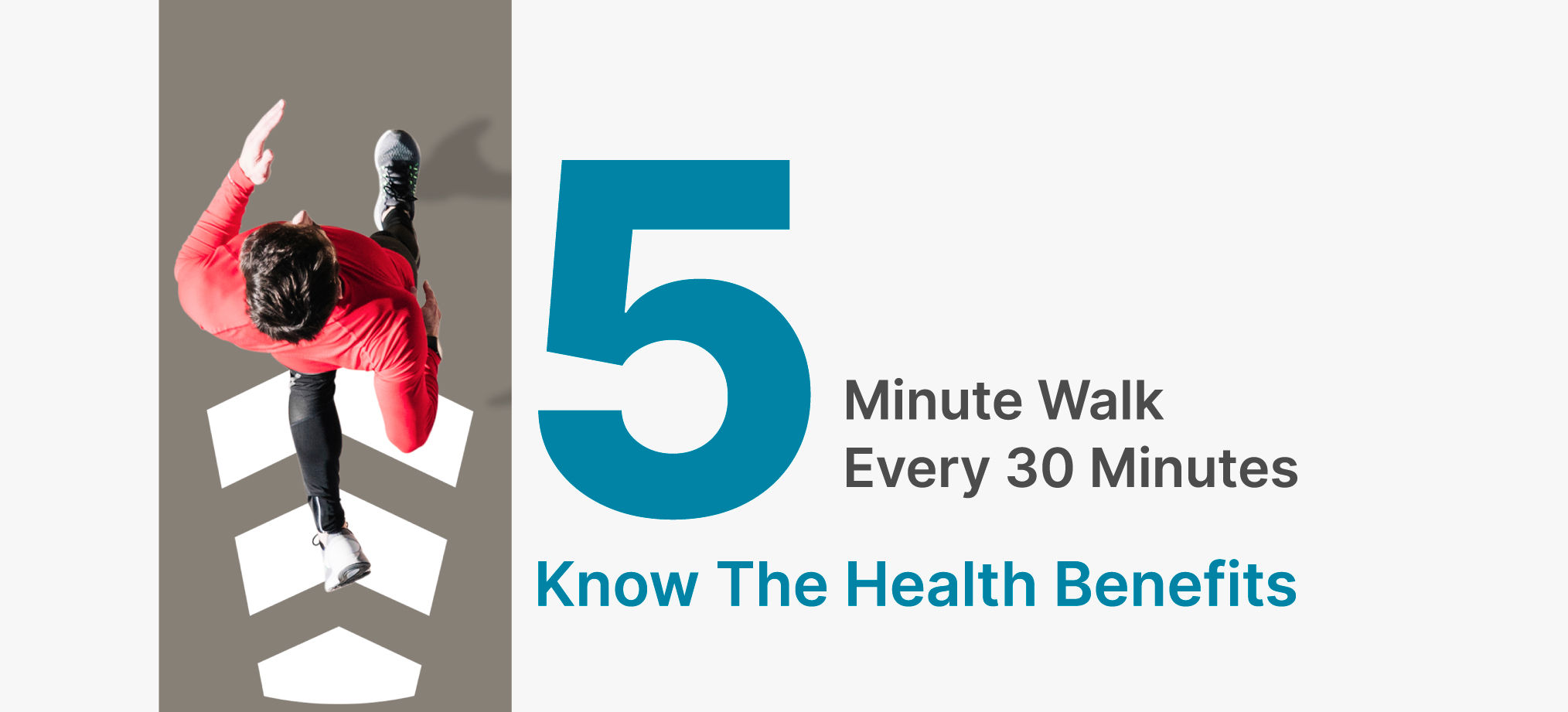General Health
Is A 5-Minute Walk Every 30 Minutes Good For Your Body?
3 min read
By Apollo 24|7, Published on - 21 February 2023, Updated on - 20 April 2023
Share this article
0
17 likes

Our demanding work schedule often keeps us tied to the chair hour after hour. And sometimes, in the wilful compulsion to complete our work on time, we even forget to take a break. As per medical science, these extended hours of sitting can have an adverse effect on our overall health. Keeping ourselves tied to the chair for long durations at a stretch can expose us to diseases like high blood pressure, high cholesterol, obesity, diabetes, heart disease, spinal cord problems, severe back pain, and sciatica. To counterbalance the ill effects of sitting for a long period of time, experts suggest everyone should take a 5-minute walk every 30 minutes.
How a Short 5-min Walk Every Half Hour Helps?
Alan Hedge, a professor at Cornell University, designed the 20-8-2 rule. It recommends that every 30 minutes, you should sit for 20 minutes, stand or stretch for 8 minutes and walk for at least 2 minutes.
Some of the advantages of a short 5-min walk are mentioned below:
1. Aids leg and gluteal muscles
These muscles are important for balancing the body and walking. A quick 5-minute walk can keep these muscles active and prevent them from weakening.
2. Avoids varicose veins
Sitting or standing for long can lead to the pooling of blood in the veins of your legs, which can eventually lead to varicose veins. Going for a short 5-minute walk every 30 minutes can reduce the risk.
3. Helps in weight loss
Regular movement helps the body to digest fat and sugar by burning calories. For a person who weighs 70 kg in weight can burn 33 kilo calories by walking for 5 minutes.
4. Reduces risks for heart diseases
As per experts, walking is a type of aerobics which can strengthen your heart and lungs. Also, walking can help reduce cholesterol levels which can further reduce the risk of heart disease.
5. Strengthens muscles and joints
A sedentary lifestyle or bad posture can lead to pain in the hip joints and back. A short 5-min walk every 30 minutes can keep these joints smooth and functional. Also, walking strengthens muscles and tendons.
The human cardiovascular and digestive systems work best when you walk or perform some physical activity. A short walk every day at 30-minute intervals helps to elevate energy levels, improve mood, maintain bone strength and reduce feelings of fatigue. However, even after abiding by the 5-min walk model, if you are experiencing back, hip or neck pain, it is best to see a physician.
FAQs
Q. How can you counter the effects of prolonged sitting?
To offset the effects of prolonged sitting, take 5-min walk breaks at every 30-minute interval. You can also go for a 30-minute walk every day to keep your body healthy. Correct sitting posture is another vital factor.
Q. What is considered a sedentary lifestyle?
Sitting or lying down for 7 to 10 hours a day with very limited physical activity is considered a sedentary lifestyle.
Q. Faster or longer walk, which is better?
Walking at a brisk pace for half an hour every day can reduce the risk of heart and lung disease, dementia and cancer and maintain overall health.
Q. What are the dangers of sitting for long hours?
Sitting for long durations tends to weaken the leg and glute muscles. This can eventually lead to balance issues and can cause injury as well.
Q. Is it better to sit than stand all day?
Both can be harmful to the body if continued for long periods, without breaks.
Medically reviewed by Dr Sonia Bhatt.
General Health
Leave Comment
Recommended for you

General Health
What is Bilirubin?: Know Normal Ranges and Health Implications
Discover the normal range for bilirubin and learn about potential health concerns associated with elevated or low levels.

General Health
The Benefits of Yoghurt in Shingles Recovery
Uncover the potential benefits of yoghurt during shingles. Learn if yoghurt can aid in the recovery process. Get informed now.

General Health
Scientifically Proven Tips to Manage Chronic Inflammation
Chronic inflammation can increase the risk of several diseases. Following a healthy lifestyle and an anti-inflammatory diet can reduce the risk of diseases significantly.
Subscribe
Sign up for our free Health Library Daily Newsletter
Get doctor-approved health tips, news, and more.
Visual Stories

Science-backed Home Remedies for Burns and Blisters
Tap to continue exploring
Recommended for you

General Health
What is Bilirubin?: Know Normal Ranges and Health Implications
Discover the normal range for bilirubin and learn about potential health concerns associated with elevated or low levels.

General Health
The Benefits of Yoghurt in Shingles Recovery
Uncover the potential benefits of yoghurt during shingles. Learn if yoghurt can aid in the recovery process. Get informed now.

General Health
Scientifically Proven Tips to Manage Chronic Inflammation
Chronic inflammation can increase the risk of several diseases. Following a healthy lifestyle and an anti-inflammatory diet can reduce the risk of diseases significantly.